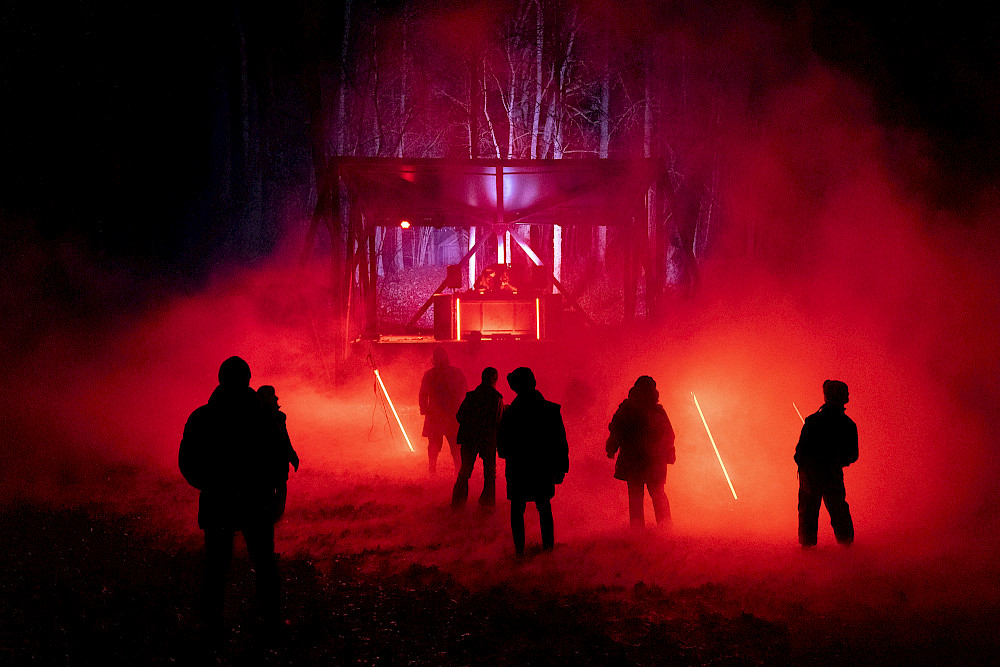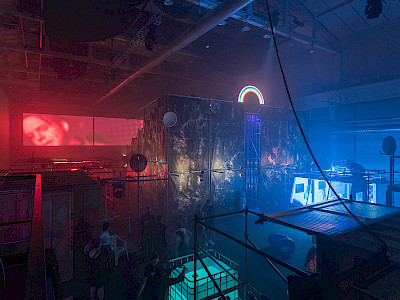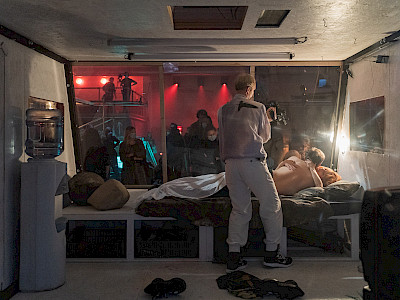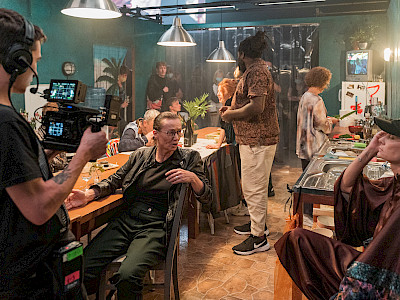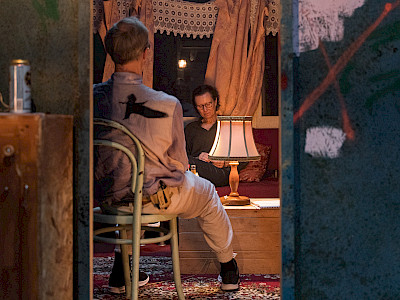23 — 25.05.2024
Łukasz Twarkowski Wrocław
Respublika
theatre
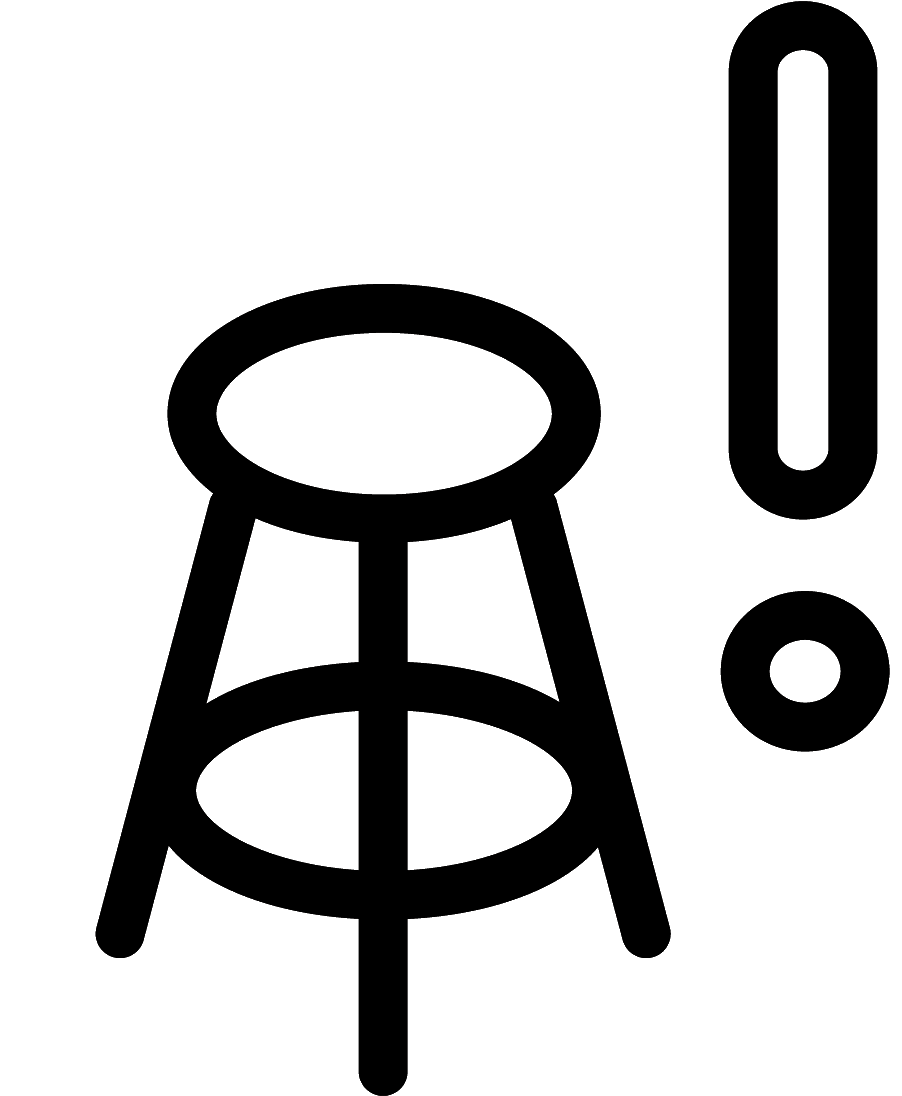 | English, Lithuanian, Russian → NL, FR, EN | ⧖ ±6h | €30 / €25 | Contains nudity, live recordings, flashlights, loud music | Free roaming, restaurant, bar, sauna | You can leave freely and re-enter
| English, Lithuanian, Russian → NL, FR, EN | ⧖ ±6h | €30 / €25 | Contains nudity, live recordings, flashlights, loud music | Free roaming, restaurant, bar, sauna | You can leave freely and re-enter
How can we establish a free, peaceful and environmentally friendly society? What kind of future could we build? In Respublika, techno, film and theatre work in concert to create a distinct, utopian world. The members of this multilingual group – brought together by artist Łukasz Twarkowski – conducted a radical experiment on themselves: for several weeks, they withdrew from civilisation to the forests of Lithuania, cutting themselves off from everyday concerns. While exploring the ideas of basic income and utopian societies, actors started DJing and experimenting with life in a rave community and the political potential of music and rave. Director Twarkowski documented this process with his camera and recorded their fears, desires and existential concerns. Using this raw material, he created a colossal six-hour happening. During the performance, the audience is free to explore and wander around. Spectators can be simple observers or, if they want, can sit down at a table with the artists, immerse themselves in the reconstructed environment of the camp, visit the meditative sauna, and of course, they can dance! After all, isn’t dancing to rave music in all its sensual and ritual dimensions also an act of resistance?
"It is not the immersive form; it is not the forest of images; it is not the state of delirium; nor is it even the unique space that gives ‘Respublika’ its value. Its beauty lies in its humanity―naked, unadorned, yet piercingly intimate."
Menų Faktūra
"Twarkowski combines the strengths of different art forms to raise contemporary questions about the contradictory relationships between the individual and society, the economy, nature, and ourselves."
7 meno dienos
The Peasant’s Paradise
Conversation with Łukasz Twarkowski
At the crossroads of film, rave, visual arts, and theatre, Respublika is a utopian, yet not sugar-coated, exploration of what could be – it doesn’t aim to teach, but rather to immerse and question. Eager to learn more, we caught up with the mind behind it to talk about everything from his inspirations, to the rise of mockumentaries, and rave as a political act.
Let’s get right to it. Tell me – how did Respublika come to life?
I was a very long preparatory process –the idea was completely crazy. The beginning of it stemmed from a real Republic, Republic of Paulava, which existed not far from Vilnius at the end of the 18th century. It was created by a Polish priest, who bought land with 800 peasants. They created an independent state which had its own army, money, some kind of healthcare system, a theatre, schools, etc. It was known as the peasant’s paradise. In the end, it wasn’t that perfect socialist state they promised, but it inspired us to search for that moment when you can really feel free in today’s world. Somehow, for me, it instantaneously connected to rave and creating temporary autonomous zones – probably the only possible zones full of complete freedom.
The next question was about what would the next biggest social change be. The first answer that we found was related to labour and work, and that we have to face the idea of basic income if we want to continue living in some kind of harmony. So, these concepts were at the beginning of this experiment – because we started it as one. We left with all creators and actors to the woods, trying to see what it would be like if we didn’t need to work or to perform. It was complete freedom.
Peasant’s paradise indeed. How did this manifest in the performance?
rom our side, we were trying to give everyone the spark of the raving culture as we know it – we were showing them a lot of movies about raving, teaching how to DJ, how to build up the new place. And pretty soon it became kind of a rule that we were supposed to do a new rave every single day.
In my mind, I had the idea of what the storyline of the performance would be – one that speaks about the society who spent whole year in the woods, trying to check out the basic income idea, but with every week, they became more and more possessed by electronic music and dance. We wanted to create this experience for the audience. Being together and dancing together may be absurd, but at the same time, finding this deep emotional connection is the most valuable thing that we can do right now.
Rave is central to your work, but Respublika is also a theatrical piece. How do you nurture these two elements and how do they interact within your work?
I can’t spoil too much about it, but I would say that it is divided in three parts. The first part re-enacts the architecture of some places from the past, which is being transplanted from the Lithuanian woods to the theatre room. Then, there is a more narration-focused part. We use live montage and double channel video, so it’s possible to follow the performance in two ways –you can watch it completely as a movie, or be a part of the events. A lot of material was shot in the woods. We first went in the summer, which was really fun. In winter, temperatures would go below zero, which made it so hard to film and enjoy ourselves. It was harsh and wet. The third part is where all acting is slowly stopping, and we transition to a rave.
The show has also been described as a mockumentary. Talk me through that notion…
I am really amazed by the development of mockumentary narrations, and I believe they are very symptomatic for nowadays. We’re in contact with hyperreality so much, that the lines are getting so blurred. In the mockumentary format, which is renegotiating the border between the real and fiction, there is some kind of very interesting tension, because you never know what really happened.
Somehow it simultaneously has the form of documentary, but it’s not fully true. It makes it much more interesting – it’s like an imaginary adventure that you’re having being a part of these events. It reminds me of Simulacra and Simulation by Jean Baudrillard, where he’s writing about Disneyland, which is needed to show that there is something less real than american life. You need to have some kind of a less real point of reference to prove that your unreal life is actually real. I feel that there is like something similar in this philosophy of mockumentary. Somehow, we believe that documentary movies tell the truth, where in fact, they can be much farther from the what we would call the truth than any fictional form.
At the same time, it feels like you’re building a utopia. So, would you say that we shouldn’t look for answers within your piece, but rather see it as more of like a thought experiment?
Yeah, we’d never provide any answers. We’re very bad at providing answers because we never searched for them. We are usually trying to test different phenomena and watch from close. I thought I came up with it, but I recently found out that it’s actually Francis Bacon’s words: “If you can talk about it, why paint it?”. So, this is how we work – we’re trying to build up a multi-sensorial experience that is impossible to grasp with words and one that is not looking for answers.
Respublika sounds like a very monumental name, but also strongly political. What does it mean to you personally?
Well, it first came from Republic of Paulava, which is the inspiration from the beginning. We wanted to show it rather as an anti-political movement, as during the show you see that they quit political issues and instead they start to work on emotions. We wanted to keep the name with political connotations that also becomes some kind of a trademark – this is Respublika, and it might as well be a name of a band or a DJ collective.
Within that, do you view art as a form of resistance?
Of course, but what is political is happening on many, many levels –it doesn’t have to be openly political to be political. I want to believe that Respublika itself is a deeply political act as well. However, I’m kind of pessimistic – I have a feeling that culture has somehow less and less resonance. Maybe it’s connected to my last years in Poland, where we see how many protests and strikes don’t do anything, and how culture is being killed by the far-right government. At the same time, as artists, we have to alert, we have to speak, we have to shout – and I know I will continue doing that.
- Extracts from a conversation lead by Evita Shrestha in june 2023 and published on the website Glamcult.com.
You can read the full version of this conversation via this link.
Presentation: Kunstenfestivaldesarts, Les Halles de Schaerbeek, Théâtre National Wallonie-Bruxelles, Théâtre de Liège
Director: Łukasz Twarkowski | Text and dramaturgy: Joanna Bednarczyk | Cast: Diana Anevičiūtė, Algirdas Dainavičius, Jan Dravnel, Airida Gintautaitė, Ula Liagaitė, Martynas Nedzinskas, Valentinas Novopolskis, Augustė Pociūtė, Gediminas Rmeika, Rytis Saladžius, Rasa Samuolytė, Nelė Savičenko, Vainius Sodeika, Komi Togbonou | Set designer: Fabien Lédé | Video designers: Karol Rakowski, Adomas Gustainis | Choreographer: Paweł Sakowicz | Composer: Bogumił Misala | Costume designer: Svenja Gassen | Lighting designers: Julius Kuršys, Dainius Urbonis | Stage operator: Karolis Juknys | Director’s assistant: Eglė Švedkauskaitė | Playwright’s assistant: Simona Jurkuvėnaitės | Designer’s assistant: Rokas Valiauga | DJ instructor and mix supervisor: Karol Rakowski | Consultant in cinematography: Simonas Glinskis | Sound designers: Karolis Drėma, Adomas Koreniukas | Light operators: Edvardas Osinskis, Dainius Urbonis | Video operator: Adomas Gustainis | Camera operators: Šarūnas Liudas Prišmontas, Naglis Kristijonas Zakaras, Ričard Žigis | Editing operator: Vytenis Kriščiūnas | Producers: Vidas Bizunevičius, Lukrecija Gužauskaitė | Translation: Vyturys Jarutis
Production: Lithuania National Drama Theatre | Coproduction: Münchner Kammerspiele
With the support of Ministry of Culture of Republic of Lithuania
